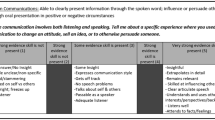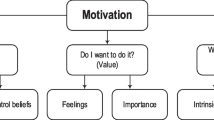Abstract
As future physicians, nearly all medical students will be required to provide face-to-face feedback. Moreover, receiving high-quality feedback from multiple perspectives is particularly valuable during the pre-clerkship training period. To address these needs, we developed a straightforward, easy-to-implement exercise that affords students the opportunity to practice giving and receiving feedback with peers. We describe how this exercise has been tailored to fit within the case-based learning small groups of our first-year curriculum and how to enhance the activity by weaving the basic principles of quality feedback into preparation sessions. This exercise has been valued greatly by students.
Similar content being viewed by others
References
Ramsey PG, Wenrich MD, Carline JD, et al. Use of peer ratings to evaluate physician performance. JAMA. 1993;269:1655–60. https://doi.org/10.1001/jama.1993.03500130069034.
Veloski J, Boex JR, Grasberger MJ, et al. Systematic review of the literature on assessment, feedback and physicians’ clinical performance: BEME guide no. 7. Med Teach. 2009;28:117–28. https://doi.org/10.1080/01421590600622665.
Ende J. Feedback in clinical medical education. JAMA. 1983;250:777–81. https://doi.org/10.1001/jama.1983.03340060055026.
Edwards MT, Benjamin EM (2009) The process of peer review in US hospitals. J Clin Outcomes Manage.
Schuwirth LWT, van der Vleuten CPM. Programmatic assessment: from assessment of learning to assessment for learning. Med Teach. 2011;33:478–85. https://doi.org/10.3109/0142159X.2011.565828.
Force AOAMCMT A Guide to the preparation of the medical student performance evaluation.
EPSTEIN RM, HUNDERT EM, LEACH DC. Defining and assessing professional competence. Editorial JAMA. 2002;287:243–4.
Pettepher CC, Lomis KD, Osheroff N. From theory to practice: utilizing competency-based milestones to assess professional growth and development in the foundational science blocks of a pre-clerkship medical school curriculum. MedSciEduc. 2016;26:491–7. https://doi.org/10.1007/s40670-016-0262-7.
Finn GM, Garner J. Twelve tips for implementing a successful peer assessment. Med Teach. 2011;33:443–6. https://doi.org/10.3109/0142159X.2010.546909.
Ferguson KJ, Kreiter CD. Assessing the relationship between peer and facilitator evaluations in case-based learning. Med Educ. 2007;41:906–8. https://doi.org/10.1111/j.1365-2923.2007.02824.x.
Shue CK, Arnold L, Stern DT. Maximizing participation in peer assessment of professionalism: the students speak. Acad Med. 2005;80:S1.
Burgess A, Mellis C. Receiving feedback from peers: medical students’ perceptions. Clin Teach. 2015;12:203–7. https://doi.org/10.1111/tct.12260.
Hattie J, Timperley H. The power of feedback. Rev Educ Res. 2016;77:81–112. https://doi.org/10.3102/003465430298487.
Henderson P, Ferguson-Smith AC, Johnson MH. Developing essential professional skills: a framework for teaching and learning about feedback. BMC Med Educ. 2005;5:11. https://doi.org/10.1186/1472-6920-5-11.
Silvia Allikmets JV. Importance of incorporating teaching of feedback skills into medical curricula. Adv Med Educ Pract. 2016;7:257–9. https://doi.org/10.2147/AMEP.S107897.
Kruidering-Hall M, O’Sullivan PS, Chou CL. Teaching feedback to first-year medical students: long-term skill retention and accuracy of student self-assessment. J Gen Intern Med. 2009;24:721–6. https://doi.org/10.1007/s11606-009-0983-z.
Ramani S, Krackov SK. Twelve tips for giving feedback effectively in the clinical environment. Med Teach. 2012;34:787–91. https://doi.org/10.3109/0142159X.2012.684916.
Neville AJ. Problem-based learning and medical education forty years on. A review of its effects on knowledge and clinical performance. Med Princ Pract. 2009;18:1–9. https://doi.org/10.1159/000163038.
Mann K, van der Vleuten C, Eva K, et al. Tensions in informed self-assessment: how the desire for feedback and reticence to collect and use it can conflict. Acad Med. 2011;86:1120–7. https://doi.org/10.1097/ACM.0b013e318226abdd.
Gigante J, Dell M, Sharkey A. Getting beyond “good job”: how to give effective feedback. Pediatrics. 2011;127:205–7. https://doi.org/10.1542/peds.2010-3351.
Wiggins G (2012) Seven keys to effective feedback 2012.
Dweck CS. Can personality be changed? The role of beliefs in personality and change. Curr Dir Psychol Sci. 2008;17:391–4. https://doi.org/10.1111/j.1467-8721.2008.00612.x.
Crommelinck M, Anseel F. Understanding and encouraging feedback-seeking behaviour: a literature review. Med Educ. 2013;47:232–41. https://doi.org/10.1111/medu.12075.
Jahromi VK, Tabatabaee SS, Abdar ZE, Rajabi M. Active listening: the key of successful communication in hospital managers. Electronic Physician. 2016;8:2123–8. 10.19082/2123.
Robertson K. Active listening: more than just paying attention. Aust Fam Physician. 2005;34:1053.
Catalano EM. Giving and receiving feedback. Manag Leadersh Skills Med Fac. 2016; https://doi.org/10.1007/978-3-319-27781-3_3.
Acknowledgements
1. Study data were collected and managed using REDCap electronic data capture tools hosted at Vanderbilt University Medical Center.1 REDCap (Research Electronic Data Capture) is a secure, web-based application designed to support data capture for research studies, providing (1) an intuitive interface for validated data entry; (2) audit trails for tracking data manipulation and export procedures; (3) automated export procedures for seamless data downloads to common statistical packages; and (4) procedures for importing data from external sources.
1Paul A. Harris, Robert Taylor, Robert Thielke, Jonathon Payne, Nathaniel Gonzalez, Jose G. Conde, Research electronic data capture (REDCap)—a metadata-driven methodology and workflow process for providing translational research informatics support, J Biomed Inform. 2009 Apr;42(2):377–81.
2. We would like to thank other CBL facilitators at Vanderbilt University School of Medicine for their feedback and encouragement during the development of this process. In particular, we would like to thank Dr. Tyler Reimschisel for his helpful suggestions and support.
3. The authors gratefully acknowledge the financial support received through the Vanderbilt Institute of Chemical Biology (RHC), the Vanderbilt Ingram Cancer Center, funded by National Institutes of Health the P30 CA68485 (RHC), National Institutes of Health grant award R01 GM33944 (NO) and US Veterans Administration Merit Review award I01 Bx002198 (NO).
Author information
Authors and Affiliations
Corresponding author
Ethics declarations
Conflict of Interest
The authors declare that they have no conflict of interest.
Rights and permissions
About this article
Cite this article
Bird, E.C., Osheroff, N., Pettepher, C.C. et al. Using Small Case-Based Learning Groups as a Setting for Teaching Medical Students How to Provide and Receive Peer Feedback. Med.Sci.Educ. 27, 759–765 (2017). https://doi.org/10.1007/s40670-017-0461-x
Published:
Issue Date:
DOI: https://doi.org/10.1007/s40670-017-0461-x




